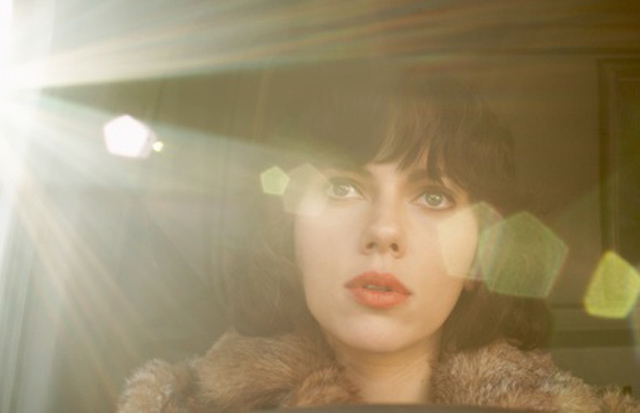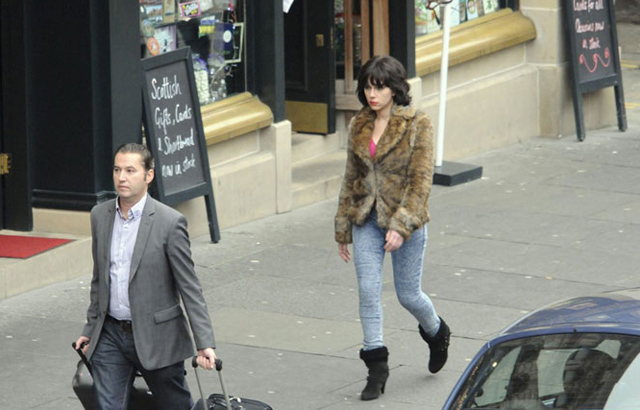CHICAGO – Patrick McDonald of HollywoodChicago.com appears on “The Morning Mess” with Dan Baker on WBGR-FM (Monroe, Wisconsin) on March 21st, 2024, reviewing the new streaming series “Manhunt” – based on the bestseller by James L. Swanson – currently streaming on Apple TV+.
Interview: Director Jonathan Glazer Gets ‘Under the Skin’
CHICAGO – The buzz for the new film, “Under the Skin,” is tremendous, both for Scarlett Johansson’s performance and the amount of symbolic and real exposure for the actress. Director Jonathan Glazer (“Sexy Beast,” “Birth”) has fashioned a metaphoric gem based on a novel by Michel Faber, about an alien visitor.
The British-born Glazer is known for meaningful films, that work on multiple layers. He began his career fashioning stylish TV commercials and music videos. His directorial debut was the unforgettable “Sexy Beast,” starring Ben Kingsley in an otherworldly performance. In 2004, he directed Nicole Williams and Lauren Bacall in the strange but lovely “Birth.” His third effort is “Under the Skin,” and he composes a symbolic journey for Scarlett Johansson, as an alien who adopts a seductive outer layer, only to begin to understand what it all means.

Through a Glass Lightly: Scarlett Johansson in ‘Under the Skin’
Photo credit: A24
Jonathan Glazer came to Chicago to promote “Under the Skin,” and his lively analysis is indicative of his talent as a filmmaker.
HollywoodChicago.com: I haven’t read the original novel, but I suspect that you have given it a different spin.
Jonathan Glazer: [Laughs] Yes, you could say that.
HollywoodChicago.com: Which element of the source was the best blueprint for achieving your interpretation of it?
Glazer: The spark was the main character’s viewpoint, her looking at us as a study, like she was trying to understand us, which was prevalent in the book. We’re with her, within her viewpoint, and I thought that was a fantastic spark for everything that happens. The specifics in the book, I wanted to leave in the book. I didn’t want to film the book.
HollywoodChicago.com: I’ve seen descriptions of the film that don’t exactly match what I interpreted regarding it. I know that true artists are not concerned with audience reactions, but is there anything you would say to a film-goer before they go into the film, to enhance the ride?
Glazer: Well, our brains have a natural inclination to want to figure things out. We want to understand what is being shown. There is a very carefully constructed logic in this film, and there is an architecture underneath it. You have to ride it like a wave, and let it take you. If you can do that, hopefully it will transport you. It’s reflective, and you get out of it what you bring in.
HollywoodChicago.com: What is the origin of getting Ms. Johansson interested in the film, and did your approach to interpreting the material change when you had her specifically on board?
Glazer: Yes, getting Scarlett involved in the film in the first place was a result of three or four years of conversations. We were orbiting around each other in regard to this project. We’re weren’t committed to each other during this period, but we kept on each other’s radar.
Her coming on board, and us understanding how to tell the story, with her in disguise and using hidden cameras, were one and the same thing. I knew exactly what would work with Scarlett in the film, once I understood the methodology. Onne the story and the method became the same thing, I understood what Scarlett would bring to it. She was the fulcrum to it all, and the central performance. Everything would revolve around her.
HollywoodChicago.com: Which of Scarlett’s previous performances gave you an inkling of how to create her character in ‘Under the Skin’?
Glazer: I haven’t seen all of Scarlett’s films, actually very few of them. I loved her in ‘Vicky Christina Barcelona,’ I love the work she does with Woody Allen. There was a moment in a music video as well, from one of her songs. It was about her in a celebrity fashion shoot, with all the people giving her things and all the richness of being her. She then gets into a car, and privately lets her face sort of drop, as if all the effort is over and she can relax. I just remember that moment being very key – it guaranteed her for me.
HollywoodChicago.com: And thematically that really comes through in the film.
Glazer: It did, but I also wanted to tell that story the way she did in the video – her insight, the fact she decided to do that. It said a lot for her intelligence and performance ability.

Hidden in Plain Sight: A Different Camera Method in Jonathan Glazer’s ‘Under the Skin’
Photo credit: A24
HollywoodChicago.com: There are plenty of symbols and statements in the film regarding relationships and connections between men and women. As we both come from a pre-tech generation, what do you observe as the pitfalls of current hook-up technology, and do you think there are elements of that presence in the film, and within the science fiction element of it?
Glazer: We live in a society in which there are cameras on every street in London. There is a new reality show in London about people watching television, the camera is where the TV is, and you watch people watching the TV. That’s an incredible place to get to, and apparently it’s a phenomenon and completely compelling.
This is who we are now and this is how we live. The game has changed for filmmaking, for example. We built a camera system to shoot covertly. That probably informed by the proliferation of images. It’s about being in the world at this time, embracing the reality.
HollywoodChicago.com: In what way?
Glazer: Well, it’s about how we credibly represent an alien on earth. It’s about her seeing us, and her seeing ultimately the value of us. That shouldn’t be fictionalized, that needs to be witnessed. We had to find a way of her witnessing us, as we are, undisturbed, in the world as it is. That all came from the idea of how we would do it.
HollywoodChicago.com: You use Scotland as a character in the film, at one point referring to it as ‘nowhere.’ What spirit permeates the region that you believe adds to the essence of what you are trying to communicate in ‘Under the Skin,’ or was that present in the novel?
Glazer: It was in the novel, and I never challenged it. It was because Scotland is a mythic landscape, huge and mountainous. The weather is extreme, snow, rain, cold, warm and wind all in a day. It’s the elements. It’s the fact that it’s not just us she is experiencing, but the crush of the elements – the waves, the light, the snow, the waves, the colors – all the things that we experience that make us what we are.
HollywoodChicago.com: Your films feature strong and distinct performances from the actors that populate them. What do you feel is the X-factor in your relationship with actors that allow those type of performances to flow, and what is the oddest question you’ve had from an actor about a character, either in this film or the others you’ve done?
Glazer: Yes, the actors do wonder what is going on sometimes. [laughs] My relationship with actors is about trust. If they think you are there for right reasons, then they are there for the right reasons – it’s very easy then, we just look for the story together. Scarlett is a perfect definition of it in ‘Under the Skin,’ because she hadn’t done anything like this before. It’s incredible to find someone like her who has the confidence – since she is so much in the public eye – to just risk everything for it. To try and do something interesting, you have to risk everything for it.
HollywoodChicago.com: Since you have roots as an filmed advertising director, what persuasive elements within that style of filmmaking did you transfer most effectively to features? Is there any little moments that only you know about this psychology that made you laugh when you placed it in a film?
|
Jonathan Glazer in Chicago, March 29, 2014 Photo credit: Patrick McDonald for HollywoodChicago.com |
Glazer: Of course, but it’s not to ‘pull the wool.’ [laughs] It’s actually what you get from TV commercials, which is a vital education. It’s the discipline of condensing a story down to one minute. It’s the economy that you use to tell that story. And then it’s about communicating more than the story. How do we multiple the story in that minute? It’s a very exciting challenge, and you learn so much from it.
When I got to feature films, it worked in a different rhythm, but I’m still trying to distill the story as much as I can. I’m trying to get to the essence of it. And my work in commercials has certainly helped me do that.
HollywoodChicago.com: You had the privilege of directing Lauren Bacall in ‘Birth.’ When you look at the films that she did in the studio system, what advantages do you think that era had in storytelling or even influence that today’s film market doesn’t have?
Glazer: It was almost like a factory, and there was something inherently great about how the worked. If you were a writer, you worked on a wrestling film from 9-to-5. There was something about that production line that was really constructive, really creative. There was something about the machinery of it that is wholly fascinating.
HollywoodChicago.com: You have a strong eye for artistic composition and creating a distinct - I hate using terms like this - ‘mise en scene,’ upon the canvas of your artwork. What is most challenging about transferring an imagined composition – which is withing your thought process – into a physical piece of filmmaking, since the medium requires so much technical interaction?
Glazer: It never stops. You want a scene to feel like your storyboard, but sometimes it’s just completely dead. The beach scene and the forest scenes in ‘Under the Skin’ were the ones carefully story boarded, but of course the difficulty is you get to the location and it’s not exactly what you had in mind. Yet you have to keep moving until it clicks, even if it’s something not in your mind. It just has to feel like what’s in your mind.
HollywoodChicago.com: Like a controlled chaos?
Glazer: That’s absolutely what it is. You know it when you feel it. If you don’t feel it, you don’t shoot it.
HollywoodChicago.com: And what did you feel in ‘Under the Skin’?
Glazer: With the use of hidden cameras among the actor’s performances, I was able to see people as they are – texting, smoking cigarettes, picking their nose – and when I saw that I realized how alone we are. We are alone together, that is sort of how we are. I think you see that in the film.
 | By PATRICK McDONALD |


